3-4 March 2025 - Consultation Visit to Moldova
- Mar 4, 2025
- 2 min read
Updated: Jun 15, 2025
Overview
From 3–4 March 2025, the P101 team conducted its first consultation visit to the Republic of Moldova, hosted by the Ministry of Foreign Affairs in Chisinau. The visit brought together key national stakeholders responsible for the protection of critical infrastructure, including representatives from the Ministries of Internal Affairs, Environment, Health, and Defence, along with cybersecurity and nuclear safety agencies.
Opening Session and National Context
The consultation began with opening remarks from the National Focal Point, who presented Moldova’s evolving security landscape and outlined the government’s strategic efforts to strengthen resilience across the CBRN (Chemical, Biological, Radiological, and Nuclear) spectrum. Moldova reaffirmed its intention to align with international standards and pursue deeper cooperation with EU partners.
Presentation of P101
The P101 project team introduced the objectives and scope of the initiative, highlighting its focus on legal harmonization, national expert engagement, and regional collaboration. Alexandre Custaud presented the project's strategic vision, emphasizing its potential as a long-term platform to support CBRN risk mitigation in Moldova and beyond.
National Reforms and Legislative Framework
The Ministry of Internal Affairs shared updates on Moldova’s legislative progress, including the development of a draft law on critical infrastructure protection. The law is designed to align with EU Directive 2022/2557 and proposes a national authority, sectoral coordination mechanisms, and a unified system for incident reporting. A national program on non-proliferation and CBRN risk reduction for 2025–2029 is also under preparation.
Technical Visits and Sectoral Challenges
The team conducted field visits to key institutions: the State IT and Cybersecurity Service (STISC), the national forensic center, the nuclear waste management facilities (Special Objects 5101 and 5102), and the National Agency for Public Health’s laboratory complex. These visits highlighted ongoing efforts to modernize infrastructure and revealed several challenges, including outdated systems, limited laboratory capacity, and gaps in chemical and cyber risk governance.
Stakeholder Dialogue and Coordination
Open discussions allowed stakeholders to share views on current needs, including technical support, training, and institutional capacity-building. The absence of a dedicated national chemical authority was noted as a key gap. Regulatory roles and procedures for cybersecurity, radiological safety, and public health preparedness were clarified.
Wrap-Up and Roadmap
The consultation concluded with a joint review session that summarized key findings and outlined next steps. An implementation roadmap was discussed, with agreement on priorities such as expert recruitment, legal reforms, and strategic planning support. Moldovan authorities expressed strong support for the initiative and reaffirmed their commitment to regional cooperation and enhanced CBRN infrastructure protection under the P101 framework.






